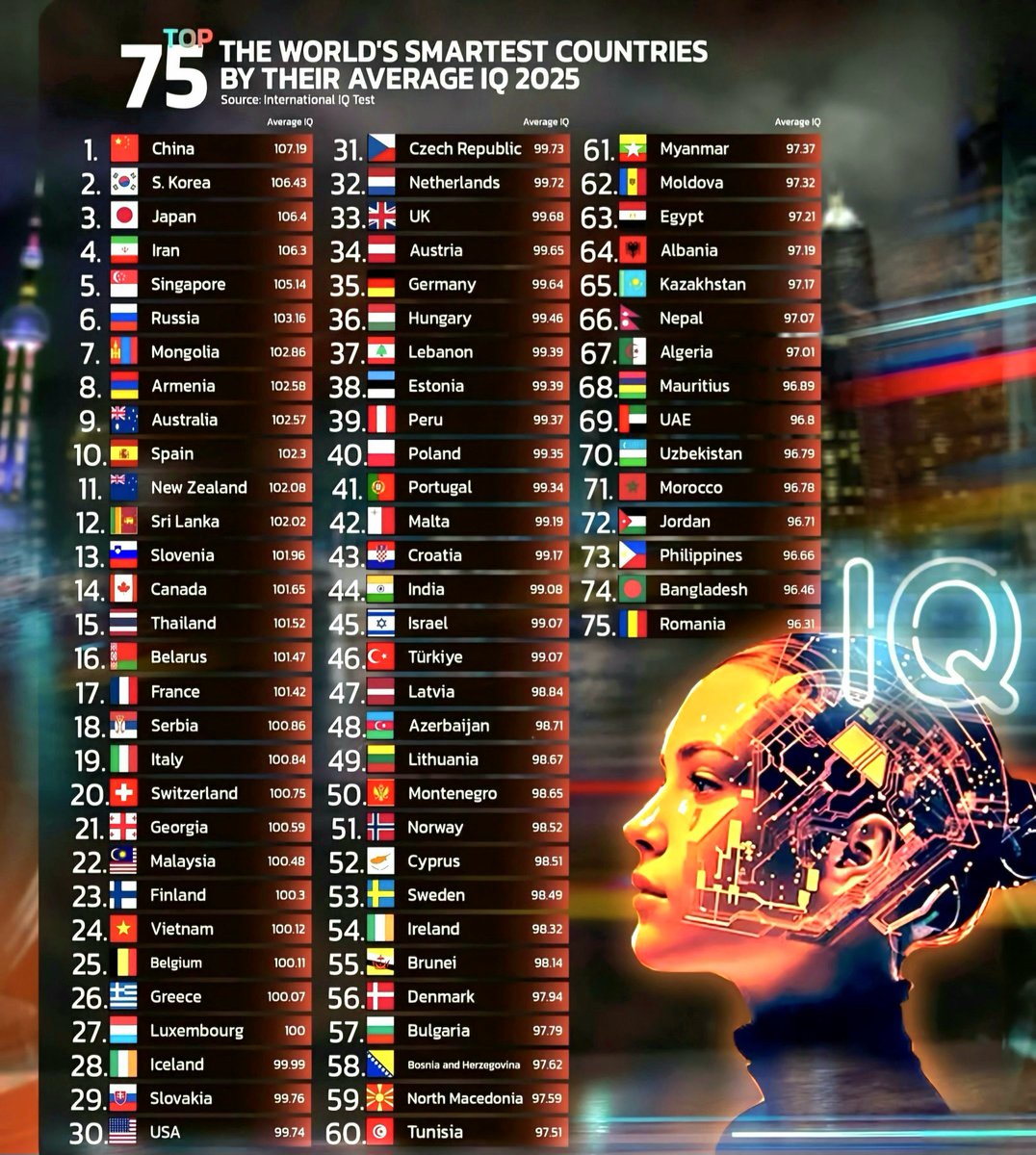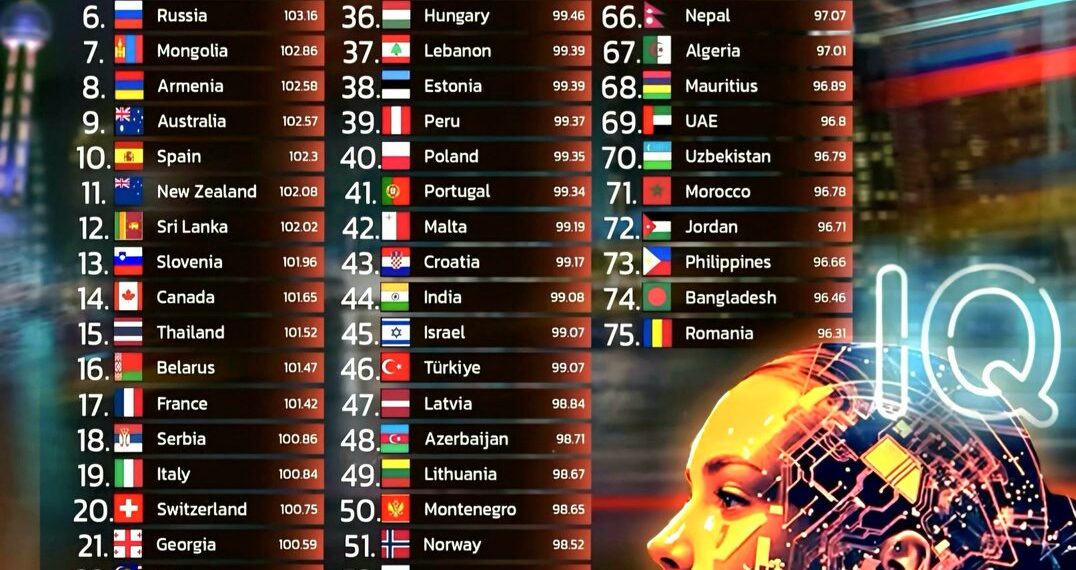Select Language:

Top 75 Countries by Average IQ in 2025: An In-Depth Look
1. China Leads the Pack with an Impressive Average IQ
China has maintained its position at the top of the global intelligence rankings, boasting an average IQ of 107.19. This figure reflects the results of over a million test-takers across the nation, highlighting China’s continued emphasis on education and cognitive development. The country’s robust investment in early childhood education, technological innovation, and academic excellence has contributed significantly to this high average.
2. South Korea and Japan Maintain Strong Cognitive Performance
South Korea ranks second with an average IQ of 106.43, closely followed by Japan at 106.4. Both countries are renowned for their rigorous educational systems and high literacy rates. South Korea’s focus on STEM fields and Japan’s cultural emphasis on discipline and academic achievement have fostered strong mental acuity among their populations. These nations consistently demonstrate the importance their societies place on intelligence and educational success.
3. Iran and Singapore: Rising Powers in Cognitive Rankings
Iran has seen its IQ average rise to 106.3, placing it comfortably within the top five. This improvement underscores Iran’s increasing investment in education and scientific research. Meanwhile, Singapore maintains a competitive edge with an average IQ of 105.14. As a global financial hub with a strong emphasis on education and technological advancement, Singapore’s high IQ rating reflects its skilled workforce and innovative environment.
4. Russia and Mongolia: Expanding Cognitive Capabilities
Russia’s average IQ stands at 103.16, reflecting its rich history of scientific achievement and education reform. Mongolia follows with an average of 102.86, demonstrating significant progress due to improved access to quality education and international collaborations. Both nations showcase how regional development and educational investments can impact national intelligence metrics.
5. Armenia, Australia, and Spain: Diverse Nations with High Averages
Armenia’s average IQ reaches 102.58, aided by a focus on education and technological literacy. Australia, with an average of 102.57, benefits from its robust education system and high literacy rates. Spain’s average IQ of 102.3 indicates a well-rounded educational approach and cultural value placed on intellectual growth.
6. New Zealand, Sri Lanka, and Slovenia: Growing Intellectual Foundations
New Zealand maintains an average IQ of 102.08, showcasing its commitment to quality education and research. Sri Lanka’s 102.02 figure highlights improvements in educational access and literacy. Slovenia, at 101.96, exemplifies the benefits of a focused academic system and investment in human capital.
7. Canada and Thailand: North American and Southeast Asian Leaders
Canada’s IQ average is 101.65, reflecting Canada’s high standards in education and healthcare. Thailand’s 101.52 emphasizes its ongoing efforts to develop a skilled workforce, highlighting the region’s potential for future growth in intelligence metrics.
8. Belarus, France, and Serbia: Notable European Performers
Belarus (101.47), France (101.42), and Serbia (100.86) continue to demonstrate Europe’s cognitive strength. France’s dedication to science and arts, alongside Serbia’s investment in education, contribute to these rankings, showcasing Europe’s diversity in intellectual development.
9. Italy, Switzerland, and Georgia: Established and Emerging Centers of Knowledge
Italy (100.84), Switzerland (100.75), and Georgia (100.59) rank closely, illustrating their long-standing academic traditions and innovative capacities. Switzerland’s reputation for scientific research and Georgia’s rising educational standards are reflected in their high IQ scores.
10. Malaysia, Finland, and Vietnam: Asia’s Expanding Intelligence
Malaysia (100.48) and Vietnam (100.12) are among Asia’s rising educational powers, investing heavily in school infrastructure and technological skills. Finland continues to outperform with an average of 100.3, known worldwide for its groundbreaking education system.
The Global IQ Landscape in 2025
The data collected from over 1.39 million individuals worldwide paints a complex picture of intelligence across nations. While East Asian countries remain at the top, there is a notable pattern of growth and investment in education within various regions. Countries like Iran, Malaysia, and Vietnam exemplify emerging trends of developing cognitive capacities through reform and development.
The United States ranks 30th with an average IQ of 99.74, signaling stable cognitive performance but also room for growth. European nations like the Netherlands, UK, and Germany maintain high standards, with averages hovering around 99.7 to 99.6.
Conversely, some nations face challenges that impact their rankings. Countries like Bangladesh (96.46), Morocco (96.78), and the Philippines (96.66) have lower average scores, often linked to socioeconomic factors and access to quality education.
Conclusion
The 2025 IQ rankings reveal the ongoing importance of education, innovation, and societal investment in cognitive development. While some nations lead consistently, others are rapidly catching up, thanks to policy reforms and educational initiatives. The global landscape of intelligence continues to evolve, reflecting changing priorities and opportunities for growth across regions.
Source: International IQ Test 2025




